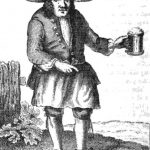As the sun sets we head home. There will be more foot traffic in the evening, but, Kelley and Michael explain, most of the evening tourists are going to the theaters, and it’s harder to get good pictures at night. Their apartment is two blocks from the Boulevard, in a former hotel I’m sure appeared in Nathanael West’s The Day Of The Locust. The building was converted into apartments in the seventies, and, based on the threadbare forest gold carpeting and avocado-colored walls hasn’t been touched since. Still I wonder how they pay the rent on a spot so close to Hollywood Boulevard. It’s cheaper than I’d think, they tell me, since the Boulevard and its surrounding blocks quickly degenerate into seediness. Just beyond the Walk Of Fame theres an entirely different breed of characters. Most are homeless drug addicts who, while held at bay during the day, become much more active at night.
As we climb the stairs to their apartment Michael explains that working the Boulevard isn’t their main source of income. He has the cliché part time restaurant job, as well as occasional commercial work. Kelley gets regular makeup gigs. Most of her jobs are small, but a good one can pay the same as more than six months of working the Boulevard. And, they apologize, dinner will be leftover lasagna.
While they’re stripping off their daywear I make a dash to a corner market for a baguette, some bagged salad and an Italian dressing, and three bottles of what, based on the price, I believe is a good Pinot Grigio. In California the corner markets have a better wine selection than some Midwestern liquor stores. Back at the apartment I’m shocked when Kelley emerges from her room. Her hair, now brown instead of shiny black, hangs loose, barely reaching her shoulders. Her skin is remarkably tanned. Dressed in blue jeans and a loose white t-shirt, she examines the wine, clicking her tongue in disapproval. If my journalistic plan is to ply them with alcohol she says I should have gotten something better. And cheaper. We’ve got some good stuff, says Michael, emerging from the bathroom in a cloud of steam. His transformation is even more shocking than Kelley’s: his hair is light brown and curly, the horns are gone, his eyes are a soft brown, his skin is a healthy pink, and his chin has shrunk considerably. He looks almost formal in khaki slacks and a blood red button-down shirt. I offer to help him put dinner together, but he ushers me out, telling me to relax. I join Kelley on the couch.
“Tell me about Mordella,” I ask. “Why did you choose her, and whats the fascination?”
“I think it’s easier to understand if you see her in action.” Kelley pulls out a DVD.
“How did you get that if its never been released in any home format?”
“It sometimes plays on slow Tuesdays in October at one of the legacy theaters. That’s how I first found it.” For a bootleg it’s surprisingly good quality. “I made it myself. It was easy. I was the only one there.” She laughs, then adds, “I could have brought in a wide-angle lens, camera, and tripod and they probably wouldn’t have cared.”
She then fast-forwards to Mordella’s first appearance, stretched out on a table in a room with mysterious symbols painted on the walls. As she opens her eyes and sits up Lugosi sounds remarkably like Victor Frankenstein, shouting, “She’s alive! She’s alive!” The camera, though, is fixed too far away. Clearly this isn’t James Whale’s work.
I can definitely see that Mordella was an inspiration, but Kelley has made some changes as well. She’s kept the long black hair done in an elaborate topknot, and the strangely heavy eyebrows and long eyelashes. But in addition to trading in Mordella’s simple black gown, which could have been an inspiration for Vampira, or even Morticia Addams, for something more intricate she’s taken the forehead scar and curved it into a gruesome smile.
“I can see the appeal,” I say.
“Oh, you have no idea.” Kelley pauses the movie. “She’s a total badass. Bela Lugosi was still a big star then. This was before the morphine, before Ed Wood. Even at the time this was low budget schlock, and no one’s sure why Lugosi did it. Maybe they blew the whole budget on him, and he’s only in a couple of scenes. Lugosi got top billing,” Kelley goes on, “but Mordella’s the one who really moves the plot along.” She then begins to fast forward again, summarizing the plot as the scenes flick by. Lugosi plays Dr. Hieronymus. He’s been able to prolong his own life artificially, but was unable to save his wife, Mordella, of course, a century earlier. Now he’s finally managed to raise her from the dead, but she’s changed. She’s no longer quite human. He loses control of her. Shortly after he revives her Lugosi’s Dr. Hieronymus inexplicably disappears and Mordella becomes the focus. She pursues young handsome men and drains the life from them by placing her hand to their chests. The police become suspicious, and a young detective begins following her. She lures him into a jazz club, then an alley where, instead of touching his chest, she places a hand to his forehead and he becomes her servant. Still fearing the police she makes him drive her out of town. As they’re passing a farmhouse he begins to shake off her control. She puts her hand to his chest, draining him, and the car goes off the road. Another car, carrying a young couple, comes by and stops. The young man gets out and offers to help. Mordella advances on him, but the young woman steps between them. She and Mordella begin to fight. Kelly holds up the remote again, allowing the final few minutes to play normally. Mordella picks up the young woman and throws her into a well. There’s a scream and a splash. The young man, on the ground now, backs away as Mordella holds out her hand to him. Then the young woman’s voice comes from the well, shouting, “I know who you are!” Mordella cackles, turns into a giant black bird, then flies off toward the moon.
The credits roll.
I’m stunned by the abruptness and bizarreness of the ending, which makes Kelley chuckle.
“So thats it,” she says.
Kelley has researched the film as much as she can, but information is limited. Mordella was played by Ilinca Tarus. Little is known about her, and this is her only recorded film appearance. She was married to the director, who is also a mysterious character. This was his first film for an upstart studio that folded shortly after its release. Both disappeared before it even premiered. They are believed to have moved back to their native Romania, but no one’s sure. There are also rumors they went to Mexico. The only other member of the cast and crew Kelley has been able to locate is the young man from the final scene. He made a career playing small parts, and died shortly after playing a store clerk in John Carpenter’s They Live.
I’m still trying to make sense of the ending when Michael calls to us from the table. “Children,” he says, “time for din-din, or I won’t bring you breakfast!”
Dinner is quiet at first. The sudden intimacy of dining in their home and realization we’re still strangers turns Kelley and Michael reticent. And they’ve been so forthcoming so far I don’t want to risk prying too much too soon. I throw out what I hope isn’t too personal a question about where theyre from, since no one in Los Angeles is from there. Michael and I are delighted to learn we’re both from the same small town in eastern Kansas. We even went to rival high schools, albeit more than a decade apart. When I mention Penny Annie’s, the candy and sandwich shop in the heart of downtown, Michael declares the need for a toast. He runs to the kitchen and returns with a bottle of tequila and three shot glasses. He fills one for himself and me, but Kelley only gets about a tablespoon. We all tilt our glasses back, and after the burn has passed I ask her if she doesn’t like tequila.
“Oh, I love it,” she says. ”I just dont like who it makes me.”
She then tells me she’s never been farther east than her home town of Needles, on the Arizona border. “If the universe had a colon blockage,” she says, ”it would be Needles.” Her dream is to be able to afford a trip to New York, but only by car. And even then she says she wants to get their by the most circuitous route possible, stopping at every roadside attraction on the way. “I want to see snow, and the Grand Ole Opry.”
I start to ask about this odd juxtaposition when Michael yells “Pudding! We have pudding!” He runs to the kitchen again and, in moments, I hear an electric beater going.
Kelley smirks. “He’s not much of a cook, but hes quite the showoff.”
After dinner we move back to the living room. As the evening goes on and the wine goes down our conversation turns more to the personal. Being young adults their thoughts easily shift to their love lives, or rather the lack of love in their lives.






Pingback: A Werewolf Problem In Southern Indiana. - Freethinkers Anonymous